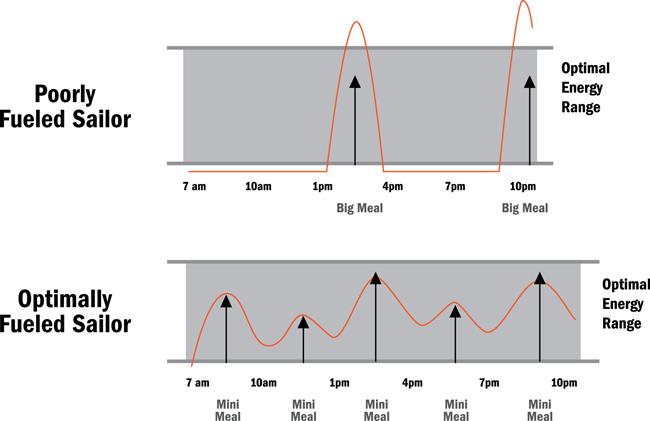1 - scroll top
2 - header search
Fuel Up: "Three Every Three"
Set the Tone! • "Break" - "The" - "Fast"
Eat breakfast every day:
- Breakfast: Increases metabolism, fuels the brain and increases energy levels.
- Don't substitute coffee, soda and energy drinks for food or a lack of sleep.
- Skipping breakfast leads to eating more calories throughout the day and later at night. Don't play catch up!
Breakfast should include:
Protein: eggs, egg whites, ham, beans, yogurt or low-fat milk
High-fiber Carbohydrates: whole wheat bread, high-fiber cereal, oatmeal or beans
Color: Fruit in cereal, oatmeal or yogurt/veggies in eggs or omelets
Continue to give the body steady fuel:
Eating smaller meals more often will help to provide stable energy throughout the day. Fuel up with the three macronutrients (carbs, protein and fat) every three hours. Skipping meals will not lead to weight loss. It will lead to lower energy and decreased physical and mental performance.
Portion Control: What is a serving size?
Choosing great foods is only half the battle to optimizing nutrition. Make sure to choose portion sizes that fit your needs.
Breads
- 1 slice 100% whole wheat, rye, white or pumpernickel bread
- 2 slices reduced-calorie bread
- 1 hot dog bun
- 1/2 English muffin
- 1/2 bagel (three inches)
- 1 roll (small)
- 6" diameter pita bread
- 6" diameter corn or flour tortilla
Vegetables
- 1 cup raw vegetables
- 1 cup cooked vegetables
- 6 ounces of most vegetable juices
Fruits
- 1 medium whole fruit (apple, orange, banana, etc.)
- 1/2 cup applesauce, unsweetened
- 3/4 cup blueberries
- 1 1/4 cup whole strawberries
- 1 cup raspberries or boysenberries
- 1 cup cubed cantaloupe or honeydew
- 1/4 cup cubed watermelon
- 1/2 cup canned fruit (canned in water or juice)
- 12-15 grapes
- 12 cherries
- 2 small plums
- 3 dried prunes (also called dried plums)
- 2 tablespoons raisins or other dried fruit
- 4-6 ounces 100% fruit juice
Cereals and Grains
- 1 ounce most cold cereals (1/4–1 cup)
- 1 1/2 cup puffed cereals (e.g., puffed rice)
- 1/2 cup cooked cereal (e.g., oatmeal, oat bran, cream of wheat)
- 1/2 cup cooked brown or white rice
- 1/2 cup cooked enriched or whole-wheat pasta
Milk and Dairy
- 8 ounces (1 cup) nonfat or 1% milk, low fat or 1% fat chocolate milk
- 8 ounces (1 cup) calcium-fortified light or reduced-fat soymilk
- 8 ounces (1 cup) nonfat or 1% plain or fruited yogurt
- 1/2 cup nonfat frozen yogurt
Meat and Protein
- 8 ounces (1 cup) nonfat or 1% milk, low fat or 1% fat
- 3-4 ounces meat
- 1/2 cup beans
- 2 tablespoons peanut butter
- 2 eggs
- 1/2 cup cottage cheese
Quick Tips:
| 3-4 ounces of meat is about the size and thickness of a deck of playing cards. |  |
| A medium sized piece of fruit is the size of a tennis ball. | |
| 1 ounce of cheese is about the size of four stacked dice. |  |
| 1/2 cup of ice cream is the size of a tennis ball. |  |
| 1 cup of mashed potatoes is the size of your fist (depending on your size; commonly the size of a female fist). |
 |
| 1 ounce of nuts should fit into the small of your hand. | |
| 1 teaspoon of margarine or butter is about the size of the tip of your thumb. |  |

